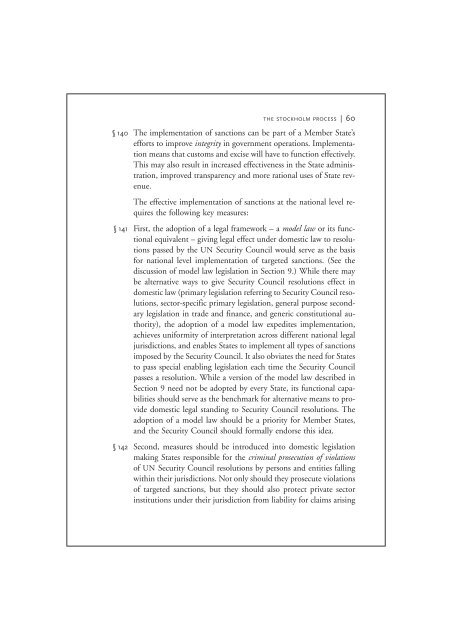Making Targeted Sanctions Effective - Small Arms Survey
Making Targeted Sanctions Effective - Small Arms Survey
Making Targeted Sanctions Effective - Small Arms Survey
Create successful ePaper yourself
Turn your PDF publications into a flip-book with our unique Google optimized e-Paper software.
§ 140<br />
§ 141<br />
§ 142<br />
THE STOCKHOLM PROCESS | 60<br />
The implementation of sanctions can be part of a Member State’s<br />
efforts to improve integrity in government operations. Implementation<br />
means that customs and excise will have to function effectively.<br />
This may also result in increased effectiveness in the State administration,<br />
improved transparency and more rational uses of State revenue.<br />
The effective implementation of sanctions at the national level requires<br />
the following key measures:<br />
First, the adoption of a legal framework – a model law or its functional<br />
equivalent – giving legal effect under domestic law to resolutions<br />
passed by the UN Security Council would serve as the basis<br />
for national level implementation of targeted sanctions. (See the<br />
discussion of model law legislation in Section 9.) While there may<br />
be alternative ways to give Security Council resolutions effect in<br />
domestic law (primary legislation referring to Security Council resolutions,<br />
sector-specific primary legislation, general purpose secondary<br />
legislation in trade and finance, and generic constitutional authority),<br />
the adoption of a model law expedites implementation,<br />
achieves uniformity of interpretation across different national legal<br />
jurisdictions, and enables States to implement all types of sanctions<br />
imposed by the Security Council. It also obviates the need for States<br />
to pass special enabling legislation each time the Security Council<br />
passes a resolution. While a version of the model law described in<br />
Section 9 need not be adopted by every State, its functional capabilities<br />
should serve as the benchmark for alternative means to provide<br />
domestic legal standing to Security Council resolutions. The<br />
adoption of a model law should be a priority for Member States,<br />
and the Security Council should formally endorse this idea.<br />
Second, measures should be introduced into domestic legislation<br />
making States responsible for the criminal prosecution of violations<br />
of UN Security Council resolutions by persons and entities falling<br />
within their jurisdictions. Not only should they prosecute violations<br />
of targeted sanctions, but they should also protect private sector<br />
institutions under their jurisdiction from liability for claims arising
















